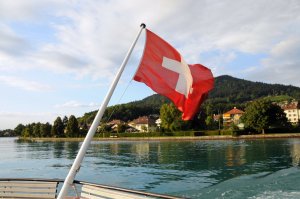Waiting to be accepted or not into Swiss society
A couple of weeks ago, during a long chat, a friend asked me: «How easy is it to integrate into Swiss society?» She happens to be a native of this country. My answer was, «It’s not easy but if you really want to, you can».
My mind then quickly reflected on the words of a well known South American revolutionist, Che Guevara, who said «Revolution is not an apple that falls when it is ripe. You have to make it fall». Integrating into the Swiss society needs a gradual change of both mind and body. You might say it is just like that everywhere but the Swiss community is particular. With strict time keeping of the public transport, extreme cleanliness and several languages, one has to put in lots of effort to fit into this unique society.
I remember the first day I saw snow. I spent some extra minutes in the window admiring the wonders of God, to a person who comes from an equatorial climate; you can imagine how I felt. This though made me miss a train that eventually led to arriving late to work. At that time, I was attending an occupation program at Botza in Valais. My supervisor was not happy and I was sent to explain to the overall Supervisor. On that day, I learnt that in Switzerland, be it snow or sunshine, work is work and time is time. In my country, the day seems slower and more relaxed.
Some months ago, as it’s an arrangement in our commune to have dinner each month with all the people from the commune, one of the people, a retired doctor asked us how we were finding the commune. We complained of people being so reserved. He told us something that I will never forget: He said «Here no one needs to look for friends, many people have their families and friends with whom they share with the same culture. It’s up to you as new comers to try to make friends. I am sure we are welcoming; inviting you to such dinners is an indication that we love you and we want to be with you. Those of you who are Christians, try to go to church, you will meet people there, talk to people and always be good…». The old retired doctor, I take him as one of the most sincere people I have ever talked too. I highly value his advice.
Being in the asylum process, waiting to be accepted or not into Swiss society as reminds me of the road to Jericho. This oldest inhabited city in the whole world is depicted as a unique city below sea level surrounded by mountains. For those of you who read the bible, you will know the popular story of The Good Samaritan. I will not bore you with the whole story but what we know is that the road to Jericho is a winding, meandering road. It’s really conducive for ambushing. As the process of the asylum application meanders, you get ambushed by stress, mistrust…
As you meander around waiting for the answer from the authorities about your asylum application, you hardly sleep well during the week as police can easily pick you up any morning. I did not know that people can stay in prison for months without a crime!! I can tell you that I get my good sleep only on Saturday and Sunday mornings. To those who make it Jericho, miracles happen there!
Allow me to also continue to paint the relationship between some people here and the refugees. To some, every refugee is a Samaritan. As you all know, the relationship between the Jews and the Samaritans was not so good. That is why when a Samaritan helped the Jew who had been beaten on the way to Jericho, he came to be known as The Good Samaritan. I would love to tell you, not every refugee is a criminal. A few times, some young people end up asking you for drugs just because they think everyone your color is a dealer.
Many of us have families, children, young brothers and sisters so we cannot allow the young generation to waste in the lovely country that is hosting us.
I totally appreciate the care given to refuges here. In Africa, refugee camps are made of tents. Many of you have seen such images in television and fellow Africans know what I am talking about. I am so happy that here one gets a chance to sleep like a human being with some dignity. Where else can you find such care? The willingness to teach you a new language to fit into the society is also something special.
I have come to learn so many things in the period I have been around. One of the most important things is endurance just the way good soldiers do. It’s also important to think positively, to concentrate your thoughts on things you can change and leave those that you cannot change.
Marcus
Membre de la rédaction valaisanne de Voix d’Exils


